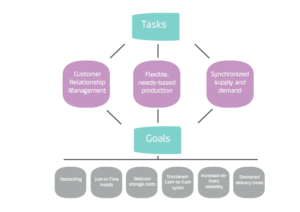Growing markets and long distances for more and more sub-products: the increasingly complex processes of the supply chain nowadays require a high degree of planning and organization, close cooperation between all partners within the supply chain and thus a more active exchange of information. What role does Supply Chain Management (SCM) play, what are its tasks and what are its goals?
The challenge
Many companies nowadays relocate their production to China, which is associated with an enormous saving of money, but makes the supply chain processes and the management more complex. Supply chains are associated with a division of labor. Whereas in the past the different steps were divided among the employees of a company, today these steps in the value chain are divided among entire companies. Not only the companies have been competing for a long time, the entire supply chain has now become part of this competition.
That’s what SCM does and wants
SCM’s tasks can be used to formulate goals and benefits and at the same time act as an incentive to become part of the supply chain and guarantee a win-win situation:

Constant contact and regular comparison with the end customer are indispensable in order to meet the above-mentioned customer requirements, especially as the requirements are constantly increasing. This is where a Customer Relationship Manager encroaches. Due to the increased number of steps within the value chain, flexible and demand-oriented production is an important factor. This results in sustainability of resources as well as an ongoing cost reduction and processes are further optimized by synchronizing supply and demand. These tasks also result in goals such as the reduction of superfluous inventories, reduction of warehousing costs, just-in-time supply, shortened cash-to-cash cycles, increased delivery reliability and shortened lead times.
The advantages of SCM are convincing, the benefits such as cost savings and accelerated processes are a great incentive for companies and all SCM participants. But in addition to the company-specific advantages, SCM also offers immense advantages that affect ecology, economy and society on a global level: SCM contributes to an awareness of sustainability and thus also hits the nerve of the moment.
